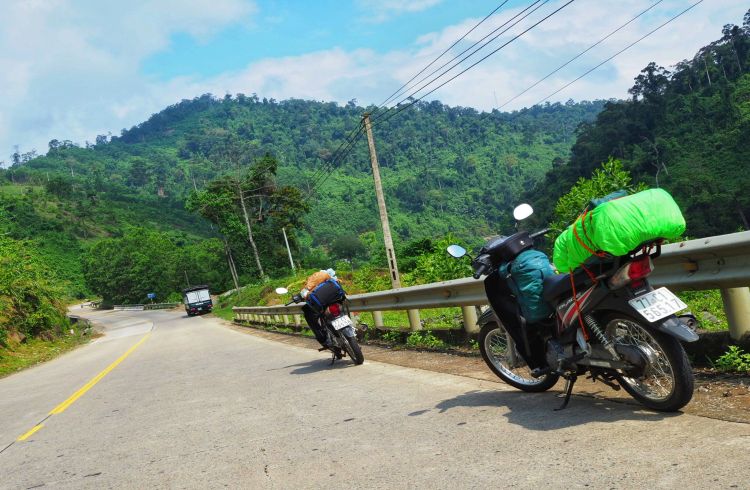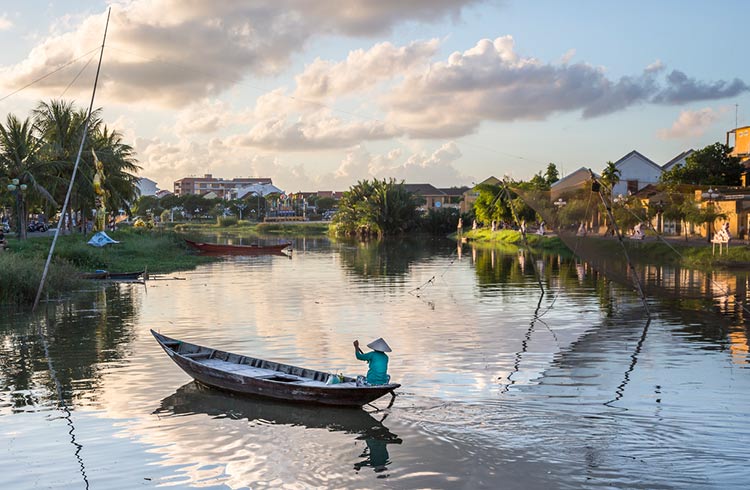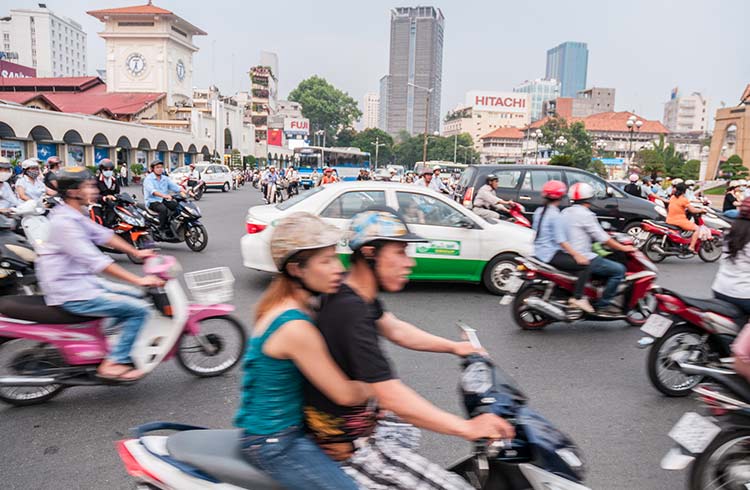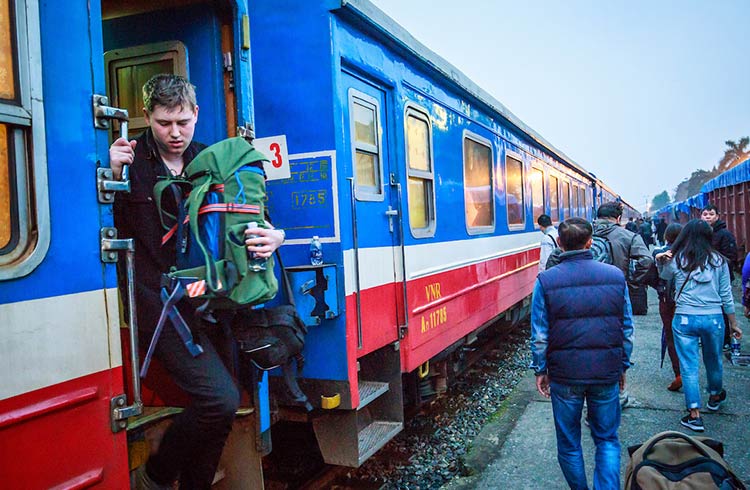Motorbike Riding in Vietnam: How To Stay Safe When You Ride
Motorbiking in Vietnam is a popular way for travelers to get around, but the process isn't simple. Jessica Hayward gives us the lowdown on how to ride legally and safely.
 Photo © Jessica Hayward
Photo © Jessica Hayward
Australian Jessica Hayward covered 4,349mi (7,000km) through Vietnam and Cambodia by motorbike, weaving through the chaotic traffic of Ho Chi Minh City and riding the entire length of Vietnam. But, how do you do this legally and safely? Here's what you need to know.
- Motorbike legality in Vietnam
- Renting or buying in Vietnam
- What bike to rent
- Tips for riding in Vietnam
- Scams to look out for
- Theft while riding in Vietnam
- Women motorcyclists in Vietnam
Motorbike legality in Vietnam
Motorbiking through Vietnam is an immersive, exciting, and spectacular way to enjoy this beautiful country. Tens of thousands undertake this adventure every year; and for many, they have wonderful tales to tell at the end of it. Here’s how to do it safely and legally.
If you’re riding a motorbike or scooter while overseas, you must check the licensing and local laws for the country you’re going to. You must also have a valid license at home for the class of motorized vehicle you may be renting.
Riding a motorbike over 50cc requires an appropriate license to ride legally and ensure your insurance will honor any claims. Additionally, make sure that you are adequately insured elsewhere. To avoid any doubt, you are not covered under this insurance for third-party liability in respect of any mechanical/motorized vehicle. Get your license before traveling to Vietnam as well as some solid riding experience.
If you choose to ride, consider travel insurance and be sure to comply with its requirements, such as riding with a helmet and being appropriately licensed to ride in your home country at your destination.
Once you have your license, you need to convert it for Vietnam. Here’s how:
- Convert your license (both car and motorbike) into an International Drivers Permit (IDP). This is legal in Vietnam if your home country has signed the 1968 IDP Convention (countries colored green on this map). This is the easiest and cheapest way to guarantee your legality in Vietnam if you are a citizen of one of the countries listed.
- If your country is a signatory to the 1949 IDP Convention (e.g. Australia, UK, USA, and Canada) your IDP is not approved in Vietnam and will not provide you any legal protection. Instead, to ensure your license is valid, you need to have it directly transferred into a Vietnamese license. This can be completed in Hanoi and Ho Chi Minh with a bit of time and paperwork.
- If you do not have a motorbike license before traveling to Vietnam, you can still investigate the option to apply for one directly in Vietnam. A practical and theory test will be required.
Without a valid IDP or Vietnamese license, your travel insurance will not be valid, even if you have a motorbike license in your home country; you are still considered to be riding illegally within Vietnam.
Also, note that some insurers may exclude “motorbike touring” for policyholders from particular countries of residence. This means you cannot travel where motorcycle is the primary means of transport, however, you are covered for incidental use of a motorcycle. World Nomads policyholders from the UK are subject to this exclusion currently. Always check the wording of your policy regardless of your country of residence.
The consequences of riding without a license can range from costly to life-threatening. You could have your motorbike impounded and your passport confiscated until a hefty fine is paid. Further punishment may also be undertaken by the Vietnamese government.
The most severe consequence is if an accident occurs. Should you injure yourself or others, travel insurance will not protect you if you are riding illegally. You will have full responsibility for any damages caused and will be at the mercy of the Vietnamese justice system for reparations.
Renting or buying in Vietnam
Buying a dirt-cheap motorbike for a few hundred dollars is often a popular option for backpackers on a budget, but it can cause a lot of frustration in the long run with maintenance issues, and in the worst case it can be extremely dangerous if the bike has mechanical faults. I would only suggest doing this if you or someone you know has knowledge of motorbike maintenance and can help you select a safe vehicle.
Alternatively, it is relatively cheap to buy a new motorbike in Vietnam, especially compared to Western countries. This option is particularly appealing if you intend to travel long-term within Southeast Asia, as you will have ownership papers, allowing you to transit with the motorbike through other neighboring countries legally.
I would recommend renting a motorbike from a reputable company (Tigit Motorbikes for example) allowing pick up and drop off in different areas of the country. Renting is beneficial for multiple reasons:
- You will obtain a copy of ownership papers for the motorbike, meaning you can safely take it into another Southeast Asia country if the rental agency agrees (mine did)
- The motorbike is guaranteed to be well-maintained and reliable
- You have the support of a Vietnamese-speaking rental agency to assist you with any problems on the road
- They provide a clear guide for maintenance requirements for your motorbike, and where to go to get this done.
Vietnam generally only allows Vietnamese bikes into the country. You will be facing difficulties crossing borders from Laos, Cambodia and China on a non-Vietnamese bike.
What bike to rent
110 cc to 125 cc will generally be sufficient for touring the country unless you intend to head through rougher country in the north and west or are deliberately seeking an off-roading experience. In those cases, it's best to hire a more powerful bike. Speed limits are low within Vietnam: 25mi/h (40km/h) for cities and 37mi/h (60km/h) for highways. You can navigate the country on an automatic, semi-automatic or manual transmission, so choose what will work best for your experience.
Try to keep to well-known brands, such as Honda or Yamaha, whose bikes are not made in China and are designed in such a way that most parts are very easy to find and replace if needed. With a Honda bike, or similar, you can take it to one of the many Honda stores for service and be assured of legitimate mechanics who will charge you a flat rate.
Tips for riding in Vietnam
Despite how congested traffic appears, the relatively low speeds mean it is not as chaotic and difficult as it may appear. Like a liquid, the traffic flows together through the streets smoothly, and your goal is to move with it and keep aware of your surroundings. Locals are paying attention to your horn, indicators and the position of your head when assessing your movement; use all of these tools liberally to help inform them about where you are going.
Expect average to poor roads in most areas of Vietnam. You will be dealing with large trucks on narrow pitted lanes, and they will not move to accommodate you. Roadsides will also often be cramped with stalls, markets and livestock, all of which will often spill into the road suddenly.
Most trucks will beep to warn you out of the way before overtaking, so pay attention to your fellow motorists. Likewise, warn others of your approach with your own horn. This especially applies on the twisting mountain roads in the west and north of Vietnam; there are multiple blind corners, and a horn is the only way to identify your approach.
Always wear appropriate safety gear, ride defensively, and be aware of the vehicles around you. It should go without saying that you invest in a decent helmet and wear it properly. Vietnam’s climate has a vast range depending in what area of the country you are traveling in and in which season. One consistent all year round is rain; it will occur at any time, often suddenly, and sometimes torrentially, so be prepared with waterproof gear for yourself and your backpack(s).
It is better to ride with at least one other person to help if things go wrong, especially if your mechanical understanding of motorbikes is limited.
Scams to look out for
Police are known to target foreigners because most do not have licenses; if you are pulled over, be prepared to show your documentation. I recommend taking the keys out of your motorbike and storing them on your person, so they are not taken unduly by officers thinking you are another illegal traveler.
Dodgy mechanics also exist, so try to service your bike at reputable stores to avoid this wherever possible. Still, chances are a flat tire will happen out in the middle of nowhere, and you will need to find a local mechanic. Try to confirm the cost before they begin the work.
Fuelling up can also be a trap for the unwary. Always check your attendant resets the fuel gauge before filling your bike so you aren’t surprised by an exorbitant fuel charge.
Theft while riding in Vietnam
Theft is a real problem. Never leave anything unattended on your motorbike – it will get stolen if it is not secured (and sometimes even then). Helmets will be cut off by the strap even if locked onto the bike, so carry them with you.
Make sure your bike is locked up in secure parking each night. Nearly all hostels or homestays have areas to secure motorbikes.
Women motorcyclists in Vietnam
I traveled with another woman through Vietnam safely. Confidence is very important, and you need to demonstrate this when interacting with locals. Single female travelers (while accepted) are still an oddity; many local women I spoke with told me that the journey we were undertaking would be considered unusual for a woman. However, I found the Vietnamese people to have a very healthy level of respect for women and we did not experience any harassment.
Related articles
Simple and flexible travel insurance
You can buy at home or while traveling, and claim online from anywhere in the world. With 150+ adventure activities covered and 24/7 emergency assistance.
Get a quote


3 Comments
You can have a valid license from home transferred to a Vietnamese license in Hanoi and Ho Chi Minh with a bit of time and paperwork. Here’s how to do that.....and???
So how do you do that???
If you follow the rules and pay attention, then you are more than likely to be safe when riding in Vietnam. However, there are the inherent risks that there are in every country. I rented bike from Rentabike Vietnam and they went above and beyond in helping me with every aspect of renting. I felt very safe.